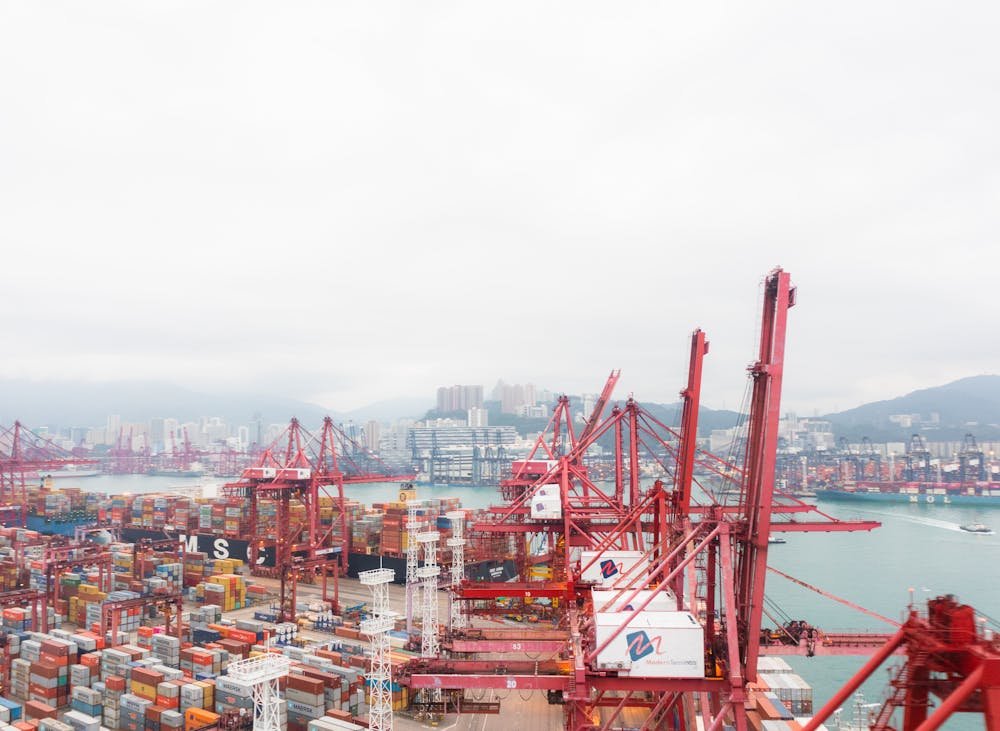
Looking for shipping from UK to China?
As one of the largest markets in the world, China has a vast shipping network. But you have to be careful. Failure to understand the costs, customs duties, documentation, and available options could turn shipping from UK to China into a nightmare.
We’ve created a simple but detailed guide to help you save costs and avoid regrets when sending goods or parcels from the UK to Chinese cities like Shanghai, Shenzhen, Guangzhou, and Qingdao.
Shipping Options: Air Freight vs Sea Freight

The main options to consider when shipping parcels are air freight and sea freight. Many people assume that the only differences between the two are their speed and cost. However, when it comes to delivery to China from the UK, there are a few more differences involved. You need to understand these distinctions before deciding which to use.
Freight Time
Air freight is undeniably the fastest way to send goods because planes are a lot faster than ships. Goods shipped from the UK to China by air will arrive 5 to 20 times faster than those shipped by sea.
Cost
Everyone involved in the shipping industry knows that shipping goods by air is a lot costlier than shipping by ocean. Generally, air freight is 4 to 6 times more expensive than sea freight. The high cost of air deliveries is a result of the limited loading capacity of planes, which greatly increases their demand and prices. Planes are also much faster, especially when they perform express shipping. Hence, people have to pay a lot more for the service.
Process
The increasingly high demand and low supply of air freight capacity have forced shipping services to transport goods in the cargo hold of passenger planes. So, your parcels are sent to China via cargo planes or passenger planes. Most times, you don’t have a say on what kind of plane ships your items.
With sea freight, your goods are transported in a large shipment container, typically 20ft or 40ft in size. There are two main options involved: full container load (FCL) and less than container load (LCL). It makes sense to use FCL if you have enough goods due for shipment to fill up a 20ft or 40ft container. If your goods are not enough to fill up a container, it’s more cost-effective to use LCL and have them share a container with goods from other customers.
Restrictions
Sea freight has way fewer cargo restrictions compared to air freight. You can ship heavier cargo by ocean than you would be able to by air. More importantly, airlines have placed restrictions on certain items, which means you can’t transport them on cargo or passenger planes. Items banned as air cargo include the following:
- Flammable materials
- Radioactive materials
- Lithium batteries
- Magnetic items (e.g., speakers)
- Firearms and explosives
- Corrosive materials
- Biological samples
- Toxic waste
Risk Factors
Contrary to what most people think, air freight is not always safer than sea freight. You have to take several risk factors into account before choosing air cargo transport. These risk factors include extreme weather conditions, turbulence, and human error. When shipping by ocean, there is less risk of damage due to extreme environmental conditions. However, piracy and theft are potential risk factors to consider.
Reliability
A cancelled flight will have only a small impact on your shipping time because planes leave the airport frequently. However, a missed shipment could have a profound impact on your delivery time. Air freight is more reliable than sea freight.
Environmental Impact
You may want to consider sustainability and the impact you have on the environment. On average, air freight emits 20 to 30 times more carbon dioxide than sea freight, leading to a much larger carbon footprint.
Ideal User
While sea freight is ideal for people shipping large quantities of goods, it’s not the best for express delivery. If you have time-sensitive goods to send to China, it’s better to use a plane.
How Much Does Shipping to China Cost in 2025?

The cost of shipping goods from the UK to China depends on several factors, including:
- Cargo weight (in kg or lb)
- Package dimensions (length, width, and height)
- Type of cargo (commercial or personal)
- Mode of transport (ocean or air)
- Type of delivery (regular or express)
- Category of products (e.g cars, accessories, perishable goods, etc.)
- Additional services or fees (custom clearance, insurance, fuel surcharges, etc.)
Due to the many factors affecting shipping costs, there is no way to find the average prices without first setting specific parameters. We reviewed several price estimation platforms and used our internal database to find the average cost of the shipment. Our parameters were a package weight of 10kg, a length of 204cm, a width of 70cm, and a height of 70cm. In shipment volume, those dimensions equate to 1 cbm.
Shipping Times from UK to China
Let’s uncover how long it takes for parcels to travel from one port or airport in the UK to another in China. The following factors affect shipping time:
- Speed of the mode of transport
- Congestion at pickup location
- Custom delays
- Loading or unloading disruptions
We did some digging using the same parameters and databases as last time. It takes 38-60 days for parcels to get to China from the UK by ocean and only 3-8 days by air. Door-to-door shipping can add from a few days to a couple of weeks to the overall shipping time.
Understanding Chinese Customs & Import Duties

When shipping goods to China, you have to pay both customs duties and import taxes. They are the additional fees you need to settle to get approval for your goods to enter the country by air or sea. Mismanaging the process of customs clearance can lead to shipment delays or legal problems. We’ve provided a quick guide to help you understand how it works.
The importer or their representative has to submit all necessary documents (see section below) and cargo specifications to Chinese Customs agents before or after the goods arrive at the surveillance zone. The customs authorities will analyse the cargo, and if everything is in order, they will issue the importer a receipt. The importer can then proceed to pay the customs duties and other fees via bank transfer. The following are the main fees you need to pay during customs clearance:
- Customs duty: This is compulsory for all imported cargo. The amount paid depends on the type of products in your cargo and their value, including transport cost and insurance premium. This duty depends on the customs tariff, a fixed percentage fee imposed on imported products. The average Chinese customs duty is 7.6% of the CIF (cost, insurance, and freight) value of the imported goods.
- VAT (Value Added Tax): These are fees calculated based on the value of the products and their customs duty. The standard rate is 13% of the total value. This rate applies to all products, except agricultural products, which have a VAT rate of 9%.
- Consumption tax: This is a variable tax imposed on certain categories of products. Consumption tax applies to luxury goods, passenger vehicles, petroleum products, and items that may be harmful to human health.
Please note that personal shipments below China’s customs threshold of RMB 50 (£5.17) are exempted from all customs duties and taxes.
Most shipping providers, including London Cargo, offer customs clearance services, so you don’t have to worry about navigating the complexities yourself. All you need to do is pay for their services and the duties and taxes associated with your cargo. You also need to provide the required documents.
What Documents Do You Need to Ship from UK to China?
Before shipping any item to China from the UK, ensure that you have all of the necessary documents. Failure to provide the correct documents could have severe consequences, including delays, additional costs, and cargo rejection by UK or Chinese authorities. The following is a list of documents required to ship from the UK to China:
- Bill of lading
- Waybill
- Commercial invoice
- Export declaration form
- Sale contract
- Certificate of origin
- Insurance policy
- Payment terms or letter of credit
- Inspection certificate (particularly AQSIQ certificate)
- Relevant licences (especially import and export licences)
Working with an expert freight forwarder like London Cargo will ensure that all of the required documentation is in place before your shipment leaves its pickup location.
Best Shipping Companies for UK–China Deliveries
London Cargo
As one of the leading freight service providers in the UK, London Cargo has the reputation and experience to consistently get your cargo to China as many times as you want. The company offers both air and sea freight at competitive rates. Other useful services offered by London Cargo include end-to-end customs clearance, commercial cargo, personal cargo, warehousing, and order tracking. Choose London Cargo if you want to deliver commercial goods to customers or distributors in China regularly.
Tips for Reducing Shipping Costs
The main reason people spend too much money sending packages to China is lack of knowledge. To ensure that you don’t pay a dime more than you need to, follow the tips below.
- Choose the right freight forwarder: The right shipping service provider could help you save a lot of money. You want to choose a company that you can build a long-term relationship with. For that to happen, they need to be reliable, affordable, efficient, and trustworthy.
- Choose the right shipping mode: Generally, you should deliver time-sensitive documents and parcels by air and larger goods by sea. Try to analyse your cargo specifications before making a choice.
- Leverage FCL: Filling a container with your items could lower cost per unit. You get to optimise package space and enjoy the discounts associated with FCL.
- Package goods efficiently: Volume plays a massive part in the overall shipping cost. Try to maximise space usage when packaging goods for shipment.
- Leverage off-peak seasons: Avoid shipping during peak seasons such as Christmas and New Year.
- Provide complete documentation: Ensure that you provide all of the documents required by the shipper. That way, you can avoid the expenses that come with delays at customs clearance.
- Use third-party insurance: Using the courier’s insurer may not be the best move. Check third parties for cheaper options.
Common Items Shipped from UK to China

The following are common items that individuals and businesses often ship from the UK to China:
- Textile goods
- Electronics
- Cosmetics and beauty products
- Leather goods
- Medicine
- Metal products
- Plastic items
- Food products
The best way to make UK-China shipping more convenient for you is to use an expert freight provider with ample experience along that route. You need a company that delivers on time and avoids delays due to customs clearance. We highly recommend that you work with London Cargo, especially if you hope to ship goods internationally for many years.
FAQs
It takes 3-8 days to ship to China from the UK by air and 38-60 days by ocean. Factors that may increase shipping time include customs delays, congestion at the pickup site, accidents, and other disruptions.
The cheapest way to deliver goods to China from the UK is to use an LCL (less than container) sea freight service. Other ways to lower shipping costs include efficient cargo packaging, off-peak shipping schedules, third-party insurance, and proper documentation.
You need to pay customs duties and taxes when shipping goods to China if the total value of your cargo exceeds the country’s customs threshold (RMB 50 or £5.17). Most commercial cargo shipments exceed this threshold.
Documents required for seamless UK-China package delivery include a bill of lading, waybill, commercial invoice, declaration form, insurance policy, payment terms, inspection certificates, and relevant licences.
Yes, you can track your shipment to China using the tracking number provided by your freight provider or courier after cargo pickup.
London Cargo is a leading specialist in sending cargo from UK.




